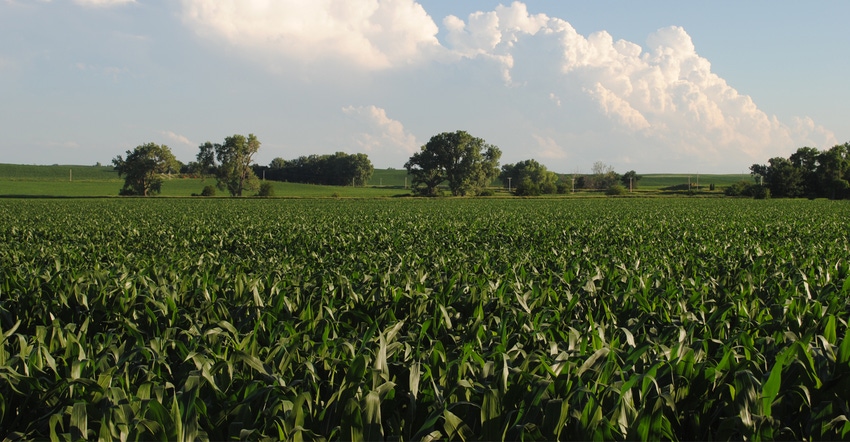
After nine years at the helm of the Nebraska Farm Bureau, retiring President Steve Nelson had one more job to do. On Dec. 9, he announced that Mark McHargue of Central City had been elected as president of the state’s largest farm and ranch organization. McHargue was elected by delegates during a virtual NEFB annual meeting and convention Dec. 8.
McHargue is a fourth-generation farmer, having operated for 30 years with his brother, Paul, raising hogs, corn, soybeans and popcorn on the family farm in Merrick County. They operate both certified organic and conventional production.
He is a 16-year veteran in NEFB, serving with the state board of directors, and more recently as first vice president. During that time, McHargue he chaired the NEFB Political Action Committee and the state Legislative Policy Committee. Over the years, his involvement also has included serving on the Merrick County Farm Bureau board of directors and the Young Farmers and Ranchers Committee.
Voice of agriculture
“I’m excited to represent farmers and ranchers in Nebraska, in the U.S. and abroad,” McHargue said in his introductory news conference. “I’ve always enjoyed carrying the voice of agriculture. We have such a great story to tell. The production we are accomplishing today is almost a miracle, compared to years ago — the efficiency, and the environment we are stewarding very well.”
McHargue said that he wants to help tell that story and the role Nebraska farmers play in the grand scheme of the economy in the country.
“Mark has an extraordinary amount of experience,” Nelson said. “He’s had the opportunity to travel on trade missions around the world representing farmers and ranchers, and he’s been very involved at the state level, working with our policy team to implement the policies that have been passed by our grassroots members at county Farm Bureaus around the state.”
“I want to continue to grow relationships I’ve been afforded as NEFB vice president, including relationships with key stakeholders and community leaders like chambers of commerce, bankers and education professionals,” McHargue said.
“In the legislative arena, I will work hard to develop relationships with state senators across Nebraska, so they know who I am, and when we sit down to have a conversation, we can have a robust conversation about things affecting agriculture, but also things affecting them in their districts. That way, we can find shared values and things we can work on together to move our state forward.”
He also hopes to stay in touch with businesses that are crucial to the state, as well as the membership base of NEFB.
“Our state is diverse, both geographically, but I would say, also culturally,” McHargue said. “I want to stay in touch with our members, and to understand their desires, dreams and the issues they are working on.”
McHargue noted that he benefited from strong mentorship as a leader. “I wouldn’t be here today if I wasn’t mentored and invested in as a leader,” he said. “I hope to return that, and mentor those who are new in the leadership arena in agriculture. I look forward to spending time working with the next generation.”
Facing challenges
When asked by Nebraska Farmer about challenges facing farmers, McHargue said we need to figure out what agriculture needs to do to position itself moving forward.
“That means adopting new technologies and being connected as we do that,” he said. “It means looking at what are niche markets and the carveouts that farmers can do to put us as drivers to succeed long term.”
He noted that Nebraska has a tremendous commodity base. “Going forward, we need to focus on marketing and developing new markets,” McHargue explained. “Going forward, trade is important, but really anything to help us in agriculture as a whole, to look at the opportunities we have to improve our profitability.”
McHargue said that during the organization’s virtual annual meeting, cattle markets were discussed at length. “Part of that was because NEFB put together a cattle task force that looked at cattle markets, and out of that came some recommendations,” he said. “We are certainly for finding ways to increase cash sales, whether that means increasing shared negotiated sales in the fed cattle market or different ways to do that.
"We are also for reforming confidentiality requirements and provisions for mandatory price reporting, so we are making sure we have good transparency there.”
McHargue said the organization had discussion in support of small, local meat processing up to midsized processing. He cited vulnerabilities in the processing structure that were exposed last spring because of disruptions from the COVID-19 pandemic. “So, we included language to encourage our smaller and midsized processors,” he said.
“We talked about was making sure that economic development funds from the state get targeted to agribusinesses, microbusinesses and ag-related businesses, because we know if we can grow our businesses locally, that will help as we look at declining populations within our communities,” McHargue added.
Climate change is an important topic that agriculture needs to tackle, McHargue said. “The important part of the question is that agriculture is very well-positioned to have solutions in that arena,” he said. “If we look at what we do in agriculture and the amount of crops we grow that sequester carbon, we can really be part of the solution.”
McHargue also shared congratulatory remarks to Tom Vilsack for again taking up the leadership of USDA. “While there are many tough policy issues facing agriculture, we have always appreciated how Secretary Vilsack approached issues with both honesty and integrity,” he said. “Nebraska Farm Bureau had a strong working relationship with him and his team for eight years, and we hope to continue that relationship in the years ahead.”
View the entirety of the NEFB news conference with McHargue on NEFB's Facebook page. Learn more online at nefb.org.
About the Author(s)
You May Also Like






